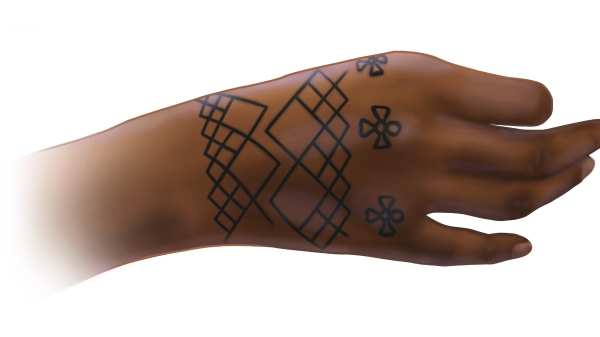ASU Biodesign researcher Hao Yan nets 2 prestigious awards

Hao Yan directs the Biodesign Center for Molecular Design and Biomimetics at Arizona State University and is the Milton D. Glick Distinguished Professor with ASU’s School of Molecular Sciences. Photo courtesy Biodesign Institute/ASU
Hao Yan, director of the Biodesign Center for Molecular Design and Biomimetics at Arizona State University and the Milton D. Glick Distinguished Professor with ASU’s School of Molecular Sciences, has been inducted as a fellow of the National Academy of Inventors.
In an impressive coup, he has also been elected to the College of Fellows of the American Institute for Medical and Biological Engineering.
Yan is a renowned authority in DNA nanotechnology and bio-inspired molecular design. His pathbreaking investigations and inventions focus primarily on techniques for manipulating DNA at the nano- or billionth-of-a-meter scale. He is an internationally recognized pioneer in creating designer nanostructures and nanorobots for cancer diagnosis, imaging, computing and multiple electronic applications, engineered from nucleic acids.
His recent awards are further evidence of his profound impact on the global DNA nanotechnology research community. The molecular engineering tools created in his laboratory have played an essential role in rapid advancements in the field.
Yan’s wide-ranging work on self-assembling DNA nanostructures include the development of:
- Nanoscale objects for use as diagnostic markers.
- Responsive enzyme nanodevices for selective chemical amplification.
- Programmable DNA-based cages for encapsulating molecules, immobilizing enzymes, sensing chemicals and delivering drugs, performing molecular computing and creating responsive materials with unique properties.
He has founded three companies and played a crucial role in the advancement of nucleic acid nanotechnology platforms for cancer therapy, cancer immunotherapy, targeted drug delivery and single-cell analysis technology. Yan has recently worked with AstraZeneca to create DNA nanostructure-based systems for targeted delivery of designer drugs to treat kidney cancer.
He has also designed a variety of nano-objects, used as diagnostic sentries. These “theranostic” innovations combine diagnostic and therapeutic properties, providing personalized interventions and improving patient outcomes.
Yan’s other inventions include DNA nanostructures capable of detecting gene expression within individual cells, offering major advantages over current DNA microchip array technologies for single-cell analysis.
To date, Yan’s contributions to the field of nanoscience have garnered 16 issued and 24 pending patents, which include applications in the field of nucleic acid-based diagnostics, imaging and therapy.
Yan’s prolific research contributions have led to more than 210 papers, more than 40 of which appear in prestigious journals including Science, Nature, Cell and their subjournals, with a number of these gracing the journal covers.
Yan is also widely recognized as an outstanding mentor to a new generation of researchers in the field of DNA nanotechnology. His commitment to fostering the development of his students has resulted in more than 30 of his former graduate students and postdoctoral researchers becoming faculty members at prestigious academic institutions globally, including Yale, Emory, Tsinghua University, the Chinese Academy of Sciences and the Indian Institute of Technology. Additionally, many of his trainees have gone on to become successful group leaders in the biotech industry.
National Academy of Inventors fellowships represent the pinnacle of recognition for academic inventors who have demonstrated a highly original approach to their field, resulting in exceptional inventions with a tangible impact on society's quality of life, economic growth and well-being.
Hao Yan is inducted into the organization as a new AIMBE fellow at the Arlington, Virginia ceremony. Photo courtesy Biodesign Institute/ASU
The American Institute for Medical and Biological Engineering is a nonprofit, honorific society dedicated to rewarding the most accomplished individuals in the fields of medical and biological engineering. Election to the AIMBE College of Fellows is among the highest professional distinctions accorded to a medical and biological engineer. The College of Fellows is comprised of the top two percent of medical and biological engineers.
College membership honors those who have made outstanding contributions to "engineering and medicine research, practice or education” and to "the pioneering of new and developing fields of technology, making major advancements in traditional fields of medical and biological engineering or developing/implementing innovative approaches to bioengineering education."
Yan was nominated, reviewed and elected by peers and members of the College of Fellows “for developing new molecular tools and nanomechanical devices for imaging, diagnosis and therapy of cancers and other important diseases.” Yan’s induction ceremony is slated for March 27.
Yan is also the recipient of the Foresight Institute Feynman Prize in Nanotechnology in 2020 and the Rozenberg Tulip Award in DNA Computing in 2013.
Additionally, he was elected as a fellow of the American Association for the Advancement of Science in 2019. Other honors include Fast Company’s 100 Most Creative People in Business (2019); Alfred P. Sloan Research Fellowship (2008); National Science Foundation CAREER Award (2006–2011); Air Force Office of Scientific Research Young Investigator Award (2007–2010); the Arizona Technology Enterprise Innovator of Tomorrow Award (2006); and the Arizona Technology Enterprise Achievement Award (2014). He currently serves as an associate editor for ACS Applied Bio Materials and as an academic associate editor for Science Advances, and has previously served as the president of the International Society for Nanoscale Science, Computation and Engineering.
More Science and technology

ASU researchers shed light on ancient tattoos in the Nile Valley
Long after an archaeological excavation, discoveries can still be made. One such example of this is newly discovered tattoos from…

ASU’s LEAPS lab marks a decade of energy impact
Nathan Johnson doesn't mince words when it comes to Earth's energy requirements.“The world needs every electron it can get to…

Smarter tools for peering into the microscopic world
The microscopic organisms that fill our bodies, soils, oceans and atmosphere play essential roles in human health and the planet’…
